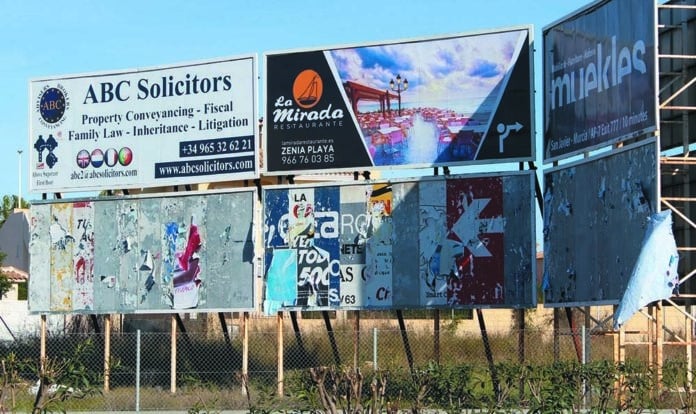The Valencian Anti-Fraud Agency (AVAF) is investigating the Orihuela council for the allegedly illegal installation of more than 50 advertising elements, both billboards and digital screens, located mainly on the National 332 road, las calles Richard Wagner, de la Cuerda, de la Rabosa and la avenida Ibiza-Lomas de Campoamor.
Following articles in The Leader Newspaper, and many emails to the Councillor for Infrastructure, without any response I might add, on January 10, 2022, in a report drawn up by the Fraud Agency, there was concern regarding the alleged existence of signage contrary to urban planning principles and regulations regarding municipal inaction in relation to the continuous placement of large advertising poles and billboards around the N-332 in the Orihuela Costa.
The investigation began at the end of December 2023 and, after studying the documentation received from the Council during the investigation phase of the enquiry, “there were only three files requesting a license or authorization for the installation of the advertising elements”.
The Agency concluded that “there were many more installations of advertising elements established in the area than there were applications requesting permission for their placement, particularly in that area of national highway 332, owned by the Ministry of Transportation.
The report that includes these alleged urban planning irregularities now recommends that the council initiate a “procedure to promote and supervise the legalisation of the urban planning laws that were infringed on all the existing advertising elements in the municipality, prioritising the area around the N-332 due to the greater density of installations, whether on buildings, supported on land or on different types of real estate.”
The objective is to impose, where appropriate, new corrective measures on the files, both open and those not initiated, “until adequate restoration of legality.”
The Agency has granted the Council a period of three months, from the receipt of the resolution that ends the investigation, to “inform the director about the start of the recommended actions or, where appropriate, about the reasons that prevent acting in accordance with such recommendations.”





